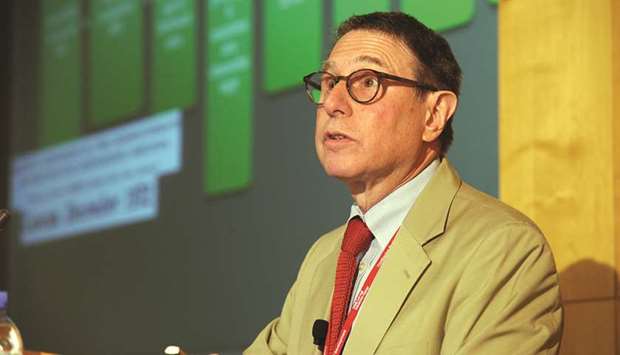An expert on paediatric oncology explained developments in childhood cancer care over the past several decades at Weill Cornell Medicine-Qatar’s (WCM-Q) grand rounds.
Dr Roger L Berkow, professor and vice chair of paediatrics at the University of South Alabama, explained how treatment of childhood cancer had been dramatically improved by advances in drug therapies over the years, as well as discussing challenges to further progress.
Dr Berkow, who gave the lecture during a visit to WCM-Q as part of the college’s Visiting Professorship Programme (VPP), said, “The cure rate over the last 50 years has improved to approximately 80% overall from 10 to 20% back in the old days, so there has been a dramatic improvement. But 20% of kids with cancer still die of their disease so progress has to continue.”
Dr Berkow pointed out that survival rates for childhood cancers increased rapidly from 1975 to 1995, but that progress then slowed. He said that barriers to progress include funding for childhood cancer research lagging far behind that for adult cancer in the United States, poor understanding in medical science of the causes of childhood cancer, and the difficulty and time needed to develop new drugs, which often takes 15 years from inception to approval by the Food and Drug Administration.
The VPP is a WCM-Q initiative that brings leading figures in medical education and healthcare to the college to view its state-of-the-art facilities and affiliate teaching hospitals, offer advice on career development to students and establish strong links between WCM-Q and other elite medical institutions.
During his visit Dr Berkow, who is the Paediatric Residency Programme director in University of South Alabama, met with students to share his insights into applying to residency programmes and answer their questions about the process. He also met with the clinical faculty in Hamad Medical Corporation and Sidra Medicine and had medical education and clinical discussions.
Gaining a place on a highly regarded residency programme at an elite institution to continue their medical training after graduation is a high priority for medical students, explained Dr Amal Khidir, associate professor of paediatrics and director of the paediatric clerkship at WCM-Q.
“It is very important for their future career development that medical students are offered more opportunities to interact with well-established educators and clinicians,” she said.

Dr Roger L Berkow
